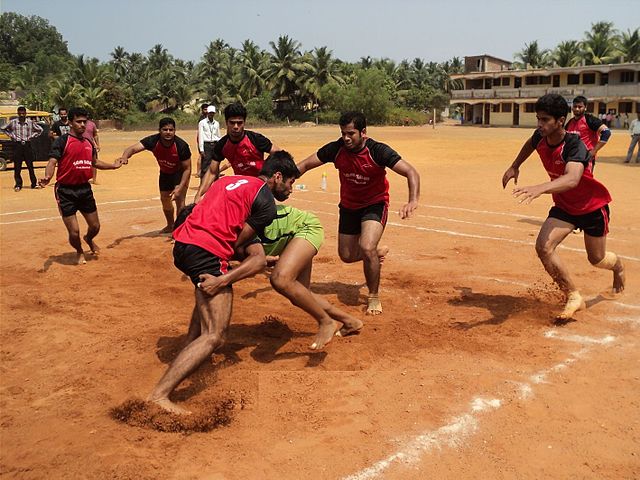Top Qs
Timeline
Chat
Perspective
Traditional sports and games
Pre-modern/non-Western heritage sports From Wikipedia, the free encyclopedia
Remove ads
Traditional sports and games (often abbreviated TSG) are physical activities which were played for centuries by people around the world even before the civilization started, before the advent of modern Western sports. Many TSGs lost popularity or died off during the colonial era due to the imposition and spread of Western sports.[1][2][3] Further decline has occurred in the post-colonial era.[4][5][6]

UNESCO promotes TSG as a form of "intangible cultural heritage", and has a dedicated TSG Advisory Committee.[7][8] Four Collective Consultation Meetings have been held so far by UNESCO, with the fourth Collective Consultation in 2018 gathering more than 82 participants from 40 countries.[9] UNESCO also played a role in helping to found the International Council of Traditional Sports and Games (ICTSG) in 2018.[10]
TSG has been linked to the way in which various peoples followed religious duties and promoted social cooperation along with a better understanding of their relationship to nature;[11][12][13][14] TSG is also seen as a possible way to increase intercultural dialogue.[15][16]
Remove ads
History
Summarize
Perspective

During the colonial era, resistance to and influence from Western sports resulted in the standardization and introduction of organized competition for several traditional South Asian games such as kabaddi.[17][18][19]
From the 18th century onwards, researchers have taken a greater interest in the value of traditional games in elucidating cultural values and identities. For example, Joseph Strutt in 1801 wrote that "In order to form a just estimation of the character of any particular people, it is absolutely necessary to investigate the Sports and Pastimes most generally prevalent among them."[20] The modern Olympic Games were influenced by this thinking, and were founded by Pierre de Coubertin on the basis of "All games, all nations", though this aspect of the Olympics was never fully realized and quickly faded away after a few years, with mainly only Western sports being played.[21]
From the 1970's onwards, global attention and institutionalization has taken place to preserve TSG.[22] In some European countries, the revival of traditional games has served as a way for regional identities to be expressed in a political or educational way.[21]
TSG has been increasingly accepted into international multi-sport events such as the Asian Games and SEA Games.[23][24]
Remove ads
Governance
Summarize
Perspective
International Council of Traditional Sports and Games
UNESCO played an initial consultative role in the collective consultations that ultimately led to the establishment of the International Council of Traditional Sports and Games (ICTSG) in 2018. Khalil Ahmad Khan was elected President. The ICTSG later declared 14 August as the International Day of Traditional Sports and Games.[25]
In April 2025, reports indicated that UNESCO and ICTSG were engaged in an internal dialogue regarding the use of institutional references and branding. No official joint statement has been issued, and the matter remains under discussion. ICTSG has clarified through an official public notice that it is an independent, external, and non-governmental organization, not governed by UNESCO and not a part of its administrative structure.[26]
The official ICTSG headquarters is located in Florida, United States, at 1210 North 70th Ave, Hollywood FL-33024, as published on its website.[27] ICTSG has explicitly stated it is not affiliated with any California-based entity claiming to represent the Council.
To safeguard against impersonation, ICTSG issued a fraud alert outlining procedures for verifying official representation and discouraging public interaction with unauthorized accounts or individuals.[28]
In April–May 2025, an organization using the name ICTSG and registered in California participated in the 24th Session of the United Nations Permanent Forum on Indigenous Issues (UNPFII),[29] held at the United Nations Headquarters in New York. The delegation was led by Shammi Rana.[30] In addition to its participation, this entity also hosted an official side event during the session, emphasizing efforts to promote and preserve traditional sports and games among Indigenous communities worldwide.[31]
Remove ads
TSG events
Summarize
Perspective
One significant event for traditional sports is the African Traditional Sports and Games Multi-Event, scheduled to take place in Swakopmund, Namibia, from June 21 to June 30, 2026. This event, organized through a partnership between The Dome Namibia and Chief Michael Shamsu Mustapha of the African Traditional Sports and Games Confederation (ATSGC), aims to showcase and preserve Africa’s traditional sports and games under the guidance of Shammi Rana of the International Council of Traditional Sports and Games (ICTSG). It will feature various traditional sports and cultural performances, emphasizing the importance of these practices in African heritage.[32]
In 2027, the Jammu and Kashmir Council of Traditional Sports and Games (JKCTSG), in collaboration with the Association of Traditional Sports and Games, India (ATSGI) and the International Council of Traditional Sports and Games (ICTSG), has proposed to host the inaugural Asian Traditional Sports and Games in Jammu and Kashmir, India. This event is expected to bring together athletes from across Asia, showcasing a variety of traditional sports from different regions. The event aims to promote cultural heritage through traditional sports, in alignment with UNESCO’s mission of safeguarding intangible cultural heritage. The proposal, spearheaded by Tarsem Sharma, President of JKCTSG and Vice President of ATSGI, reflects ICTSG's broader goal of global traditional sports promotion.[33]
In 2028, Zimbabwe will host the Traditional Sports and Games Multi-Event Festival. The event, organized by the Zimbabwe Traditional Sports and Games Federation (ZTSGF) in partnership with the African Traditional Sports and Games Confederation (ATSGC), will feature a variety of traditional African sports, such as ball games, combat sports, dances, and water sports. The festival aims to promote cultural heritage and strengthen unity across Africa. It will take place in several cities, including Harare, Victoria Falls, and Bulawayo. This festival aligns with UNESCO's efforts to safeguard traditional sports and games, highlighting their cultural importance globally.[34]
Remove ads
See also
References
External links
Wikiwand - on
Seamless Wikipedia browsing. On steroids.
Remove ads
